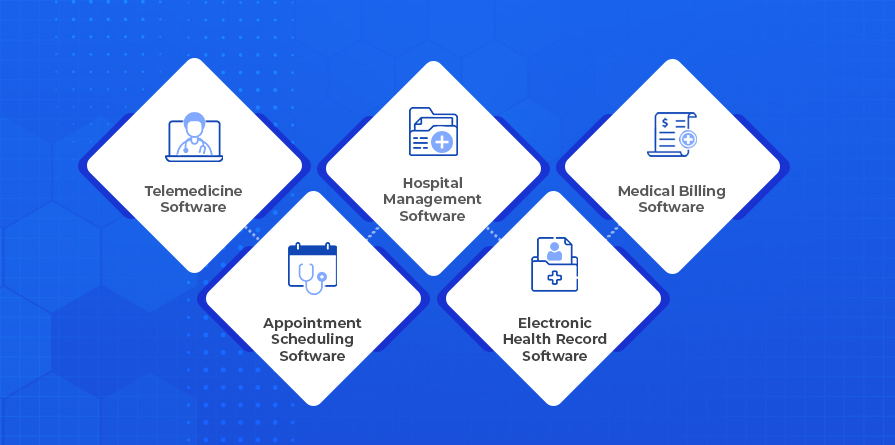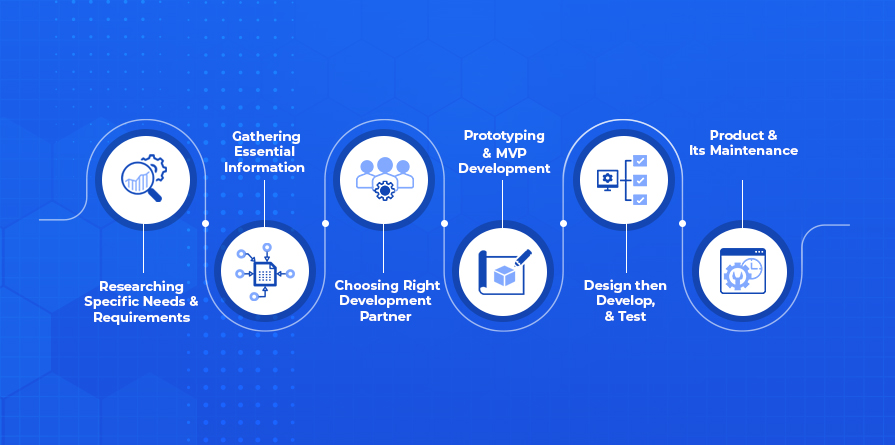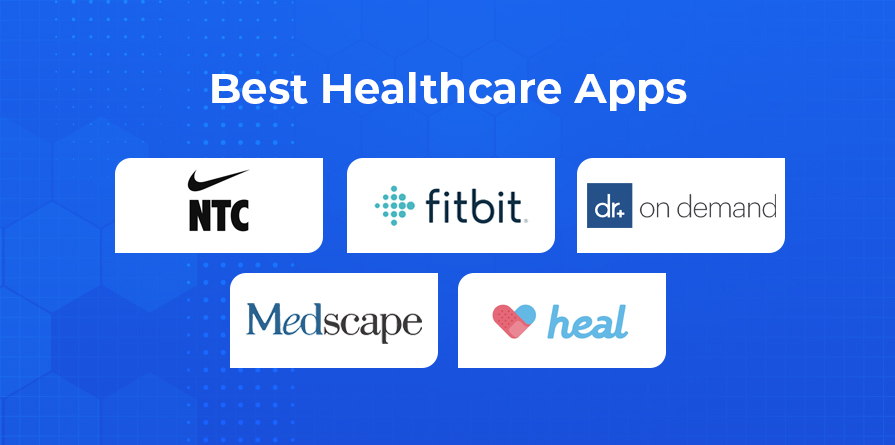Everything You Should Know About Healthcare Software Development In 2023: A General Guide
General Guide
With the onset of the global Pandemic in 2020, healthcare has become one of the most trending online services across the world, as most people are beginning to avoid physically visiting the hospital.
These services are facilitated using various Healthcare software solutions. Although Healthcare is a trending topic, it’s a bit complicated. One can read many articles on the subject, and they may end up getting even more confused.
Developing healthcare software is a tedious and complex process, but in 2023 it’s become very accessible. In this article, we’ll discuss everything you need to know about Healthcare software & its development process. Read on to find out!
What is Healthcare Software?
Healthcare software is used to improve patient care through IT systems. This can include EMR or EHR (electronic health records), PHR, and various software, which substantially increase diagnosis accuracy.
It’s a tool of information sharing between medical professionals to give their patients the best possible experience. You may find the terms such as “healthcare ” and “medical software” used interchangeably many times. However, they cover related but different domains.
In essence, healthcare software development covers various activities directed at solving the problems within organisations in the healthcare domain and the relations between healthcare professionals and patients.
The industry involves clinical services, hospitals, medical equipment providers, financing for medicine, and R&D centers. Software development for healthcare systems establishes an ecosystem where healthcare services gain higher quality and accuracy.
Why should you build Healthcare Software?
Medical software is the leading technology for digital transformation in healthcare among virtual reality solutions, wearable medical devices, or on-demand healthcare.
There is a rising demand for software development in the industry. The percentage of medical practitioners and patient engagement software is also constantly growing. The medical system is more personalised thanks to digital solutions, allowing continuous care at any place and time.
The main objective of such applications is to create a customer-centered digital healthcare ecosystem. Creating a scalable information space that can be used in clinical institutions and regional networks is necessary.
These systems connect patients, medical consultants, and healthcare providers, which benefits all stakeholders. Apart from this, healthcare software brings benefits like
- It does away with the daily paperwork.
- It facilitates seamlessly manage all processes in hospitals
- It provides communication tools for health organisations
- It significantly reduces costs by automating processes
- It improves diagnostics and the quality of medical services
- It provides the ability to make appointments remotely
- It aids self-management through symptom tracking resulting in better prevention
- It increases user satisfaction
- It remodels the patient-doctor relationship towards a more collaborative approach.
- It gives extensive information and educates about health issues.
The benefits mentioned above prove that medical companies should dive into healthcare software development to succeed in the market.
Types of Medical Software

There is no standard or universal medical software type. Each case is different and serves different purposes. We can distinguish the following types of medical software
Hospital management software can manage the overall activities of any healthcare organisation and assist in operating several administrative tasks such as doctor management, patient management, bed management, and so on.
So, it can help to reduce the workload and provide an organised system for your medical organisation. Features of Hospital Management Software are
- Provides an effective financial management
- Incorporated with OPD & IPD system
- Appointment handling system
- Smooth billing and prescription system
- Human resource management system, and more.
If you have required to conduct only the billing activities of your healthcare organisation, you can integrate the Medical billing software. It can be able to conduct the entire billing process as well as ensure secure transactions. So, you can easily keep track of all transactions, patient invoices, and so on. Features of Healthcare Billing Software are
- Provides appointment management system
- Allows medical claim management
- Credit card payment system
- Generate an accurate report
- Provides patient information, and so on.
Electronic health record software allows the users to keep a record of all essential information. Also, it can provide the facilities to store patient information, medical charts, clinical data, and so on.
Moreover, the EHR software allows the operator to access the centralised database easily, and the operators can retrieve any data they want. Features of Electronic Health Record Software are
- Integrate with AI-based tools
- Effective IT management system
- Task management system
- Provides smart analytics tools
- Integrated with a centralised database and more
The most crucial thing for any healthcare organisation is to manage the appointment system, and you can take this advantage through appointment scheduling software.
The appointment scheduling software allows the operator to take online appointments and keep a record. So, it can save time for both patients and operators and build a more convenient system for the patients. Features of Appointment Scheduling Software are
- Auto reminder system
- SMS and email notification system
- Appointment handling process
- Calendar management system
- Doctor management system, and more.
Telemedicine software is another significant type of healthcare software that can provide the opportunity to consult with the doctor via the internet.
This software allows the doctor to prescribe the medicine after observing the patient through video conference. So, you can choose this type of healthcare software because it will be more convenient for the patient in case of any emergency. Features of Telemedicine Software are
- Provides e-prescription system
- Allows electronic health record system
- Build-in chatbot system
- Smooth billing system
- Support multiple payment gateways and so on.
These are the core types of healthcare software that will need to modernize your healthcare organisation. So, you can grab your required one.
Guide on developing Medical Software

It’s challenging to develop a healthcare web or mobile app without a grasp of the application’s functionalities, features, and goals. Healthcare software development is a lengthy procedure that specialists must carry out. In the general development process, the following steps are included
Before you begin developing your healthcare product, make sure to know the needs of your target audience. Research for this goes beyond simply conducting a market analysis, though it can be part of the list.
You need to figure out what your product will be used for or simply the problem it seeks to solve, your potential users’ reviews about it, and how it will be used.
Understanding the demands of customers is a crucial aspect of any industry. Having an idea of the issues they have with the current solution and how it can improve.
Define the user persona and their demand to proceed with your solution as accurately as possible. It might also be beneficial for selecting a sector in which to launch your app.
After getting a grasp of the market, you need to outline the requirements for your product. Another crucial aspect is deciding whether your application will be delivered on a mobile device (iOS, Android, or the web).
A strategic digital transformation plan must specify not only what it intends to resolve and for whom but also the technology best suited for that. It’s essential to understand if your solution is technologically sound. Once you get that, make sure it’s also financially sound.
Getting professional healthcare software development services will guarantee that your app has all of the latest functionality and uses proper technology and features at a low cost. Your app development partner will further research various stack technologies to get the best one for you.
A prototype is a kind of interactive mock-up of your product. It’s not a complete solution but a base for it. Prototyping is essential for various reasons
- It’s a great way to test a product before building it.
- You can gather feedback and ensure you’re going in the right direction before investing too much money, time, and effort in development.
- You diminish the risk of failure & adjust your project while working on it rather than in the end when it will be more expensive to fix mistakes.
Another option to get validation is an MVP.. It’s a simplified final product version that covers just the most critical functionality. It’s an excellent tool to see if your concept is exciting and should be explored further or if it can benefit from some pivots to the underlying assumptions.
One of the most crucial stages of healthcare software development is design. You should never forget that the user interface is where patients and doctors will interact with your software, so you must ensure that this experience is easy and seamless.
Another critical process when developing healthcare solutions is testing. Everything should be tested by quality assurance (QA). It will assist in reducing development expenses & other resources, identifying various issues, and building your reputation as a healthcare organization.
This is the time to invite your customers after the application is ready. Keep in mind that there are still some post-development steps left.
You must keep your application up-to-date if you want it to be a success in the long run. This implies regularly implementing bug fixes, updating the application to reflect new regulations, and constantly improving its security and performance.
What’s the Future scope of Software Development in Healthcare
2020 demonstrated how helpless the world could be when facing a pandemic. It has shown that healthcare systems in even developed countries need to be transformed. This transformation is impossible without the state of the art technology, as the challenges are massive.
Healthcare is currently undergoing a digital revolution like all other domains. Data Science, Machine Learning (ML), and Artificial Intelligence are expected to dominate the healthcare software development processes in the decades to come.
These new-age technologies will facilitate the development of unparalleled products and modern systems that will improve the lives of millions of people globally. Software for healthcare centers, such as digital workplaces for Doctors, medical staff training, drug prescription assistance, and health information exchange.
For patients – healthcare chatbots, medicine applications. For medical device manufacturers – medical apps for users, cloud solutions for data storage and management; for pharmaceutical companies – systems for drug testing and medication guidance, etc. Overall, healthcare technology pursues the following ambitious goals
- Having sustainable & long-term healthcare systems
- Prevention of Pandemics & Epidemics.
- Improvement of patient-doctor interactions
- Making a breakthrough in curing terminal diseases such as cancer, AIDS, and other diseases
- Increase in life expectancy and quality
Famous Examples of Healthcare Software Development

There is a plethora of healthcare apps available in the market, so it might be challenging for you to pick the promising ones from the rest. But, this list of the best healthcare apps has proved credible over time and has a well-built reputation with many positive reviews.
Take a close look at the most prevalent healthcare apps and learn from their robust features and any potential gap you can fill.
From amateurs to fitness enthusiasts and experienced fitness professionals, Nike Training Club is one of the best examples of software for the healthcare industry. Although Nike released this app a few years ago, the Covid-19 era made it famous as people needed to stay fit in their homes without professional workout equipment.
When it comes to tracking healthcare and fitness activities, Fitbit is the leader. You can connect this app with smartwatches or physical trackers to measure your sleep, oxygen saturation level, heartbeat, workout, and many more. Interestingly, more than 30 million people use this app once a week.
With a 4.8 rating on the Play Store, Doctor on Demand is a well-known app for virtual healthcare and its future. Its key features include – live video calls with physicians, GPS tracking, a medical record database, emergency case management, etc. The app also contains guides on how to build a healthcare app like it.
This app is a prominent example of medical software development for physicians and healthcare professionals. Medscape offers up-to-date news and information about the healthcare industry, medical references, disease and drug facts, etc.
This healthcare app helps senior citizens connect with certified doctors and caregivers without leaving home. It offers in-home visits and telehealth services and works with patients’ health insurance. With an up-front payment system, users can avail several services, including mental health care, emergency care, regular care, etc.
Considerations for Healthcare Software Development
With the advent of 2020, we have seen an upsurge of healthcare SaaS startups and product firms worldwide, with most of them outsourcing their medical software projects. But most importantly, where should you outsource?
Vendor selection is a complicated and lengthy process, and a wrong choice can ruin the whole project for you. Here are a few crucial things you should look for in a software outsourcing company
To provide adequate healthcare software solutions, you must deal with vast volumes of sensitive information. Hence, ensure your future outsourcing partner builds a healthcare app with robust security practices and complies with international security regulations like HIPAA, PCI, and ISO.
If you have chosen the appropriate tech stack for your healthcare app, ensure that the company has relevant competencies. For instance, a clinical software development company must have sufficient expertise in embedded software development.
Try to hire large or mid-size development firms as, in all likelihood, they are quite experienced in handling large-scale projects with better capacity, tools, and processes. Based on your software project requirements, they should provide you with ample resources and a sizeable team.
The development company must have profound domain expertise to build a successful healthcare app. Look for similar projects that they have worked on in the past.
A healthcare app is a multi-tiered software with varied technologies and complex architecture. Hence, your healthcare software development company must have experienced developers who can work on your project.
Conclusion!
Healthcare technologies have proven they can be more than beneficial to humanity by playing a significant role in developing medicines and vaccines, providing high-quality patient care and diagnostics, and generally saving lives. With all the fantastic medical technology trends in mind, we can expect many breakthroughs in the upcoming decades.
Healthcare organizations focusing on the user experience will have a higher chance of fulfilling their goals, getting ahead of their competitors, and providing people with the right solution. Choosing the right custom healthcare software development company is nearly as crucial as having a great concept.
Now it’s your chance to convert your idea into a working application. We at Rudra Innovative would be more than grateful to help you in this journey.
